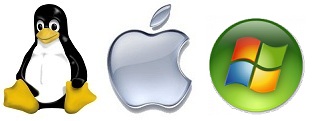Saturday, October 29, 2011
Operating Systems: The Battle Rages on
I've never understood the "which one is better" debate over operating systems. The entire concept of the debate is asinine. Sure everyone can have a preference, but the whole point and specialties of the various systems allow them to all be decent in their own little ways. Today, I'll look at these system's strengths and weaknesses.
Linux/Unix
Company: Various
Cost: $0 - $210 (Note: Linux prices generally pay for manufacturer support, not the product as Linux is free)
Flexibility: High
Ease of Use: Low
Unix and Linux oozes use. It can do anything you want it to, but you have to know how to do it. Unix/Linux systems cannot get picked up by just looking online for answers. The system requires special knowledge and experience.
Strengths:
- Flexibility: Unix and Linux systems are built to do whatever you want with them. They tend to be the better choice for nearly every networking function and can do a lot of the functions the other operating systems are specialized in better.
- Cost: Although Unix can get expensive, Linux is free. If you're willing to forgo product support, you can have an entire network infrastructure and environment for only the cost of the hardware.
- Minimal Application Costs: Most programs and applications on Unix/Linux systems either come with the OS or are free. Considering the overhead for applications can exceed $70,000 in an enterprise environment.
Weaknesses:
- Usability: Better hope you have an administrator that knows Linux. The flaw of massive flexibility in computers generally has always been the lack of usability. Although Linux has improved in the last few years, Unix and Linux requires tons of specialized knowledge that can be rare and expensive to acquire.
- Support: Although you can build an entire enterprise and pay $0 in software, the loss is a complete lack of support form the software designers. Unless the company chooses to fix the issue (for paying customers) and provide it to you, your company may need to correct your issues on your own.
- Programming Required: The best specialization software is the ones built by the company that has the need. This means hiring programmers to build and support the specific needs of your company. This also severely reduces the functions in an "At Home" network.
Windows
Company: Microsoft
Cost: $119 - $219 (Workstations), $1000 (5-Licenses) - $3000 (25-Licenses) (Servers)
Flexibility: Moderate
Ease of Use: Moderate
The quintessential enterprise system. Most enterprise environments choose this over any other operating system. It has enough flexibility for most environments and is very easy to use.
Strengths:
- Flexibility: Although not as flexible as Linux/Unix, Windows offers all the required uses needed for common enterprise and home environments.
- Usability: Windows is the most recognized product in software. User training isn't even required most of the time since most people learn via home computers and high-school/college courses.
- Support: Nearly every program is built or ported to Windows. Furthermore, support from Microsoft and the independent program companies is top notch. Microsoft also has the most rapid patch development and release program in computers today.
- Cheap Maintenance: Administration is easy. Therefore, hiring Windows administrators is cheap.
Weaknesses:
- Limited Specialization: Windows only specialized based on the OS load as defined by Microsoft. There tends to be a lot of garbage that may not even be used based on the needs of the system. These cannot be removed. Also, UI customization and manipulation is not as robust as Linux.
- Cost: Windows is expensive especially for Servers.
- Targeted: Because Windows owns 80% - 90% of the market, Windows is the most heavily targeted operating system worldwide for viruses, malware and spyware.
OSX
Company: Apple
Cost: $29.99 (Price is the OS only, requires Macintosh hardware to run)
Flexibility: Low
Ease of Use: High
The infamous Macintosh operating system.
Strengths:
- Audio/Video: Although Apple ruined this for visual a few years ago, they have since implemented proper HD. Apple has the best method to mix, produce, develop and compose any audio visual out there.
- Upgrade Costs: Upgrading the OS in a Macintosh is immensely cheap. The price quote above is to upgrade to OSX Lion at the time of this post.
- Social Value: At some point, the apple symbol became a consumerist symbol. Similar to the Starbuck's symbol, Apple sells a lifestyle with their product. If you care about these things then this may be the system for you.
- Nearly no Knowledge Required: The OS is so intuitive that nearly anyone can use it with no training at all.
Weaknesses:
- No Self Maintenance: Repairs (especially hardware) must be conducted by Apple certified techs. This can make maintenance very expensive after the warranty ends.
- Cost: The cost of a low end Mac Pro is about the price of a Upper-mid grade PC. Also hardware upgrades are steeply priced.
- Weak Flexibility: OSX is not known for a wide array of uses. It serves basic home uses and audio/visual uses.
- Limited Third Party Support: Support for Macs have improved over the years, but many companies don't support OSX because not enough people use it.
That's about it. As I've said, all of these systems have their uses and in certain environments having all three on a network wouldn't be unheard of. Although I cannot support a consumerist reason for a Mac, I can support its niche as an easy OS for people with no experience to pickup and use.
Labels:
computers
Subscribe to:
Post Comments (Atom)

No comments:
Post a Comment